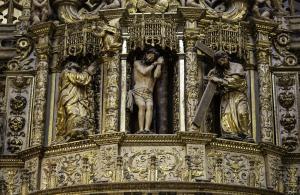
Jesus glorified God the Father in everything he did. “I glorified thee on earth, having accomplished the work which thou gavest me to do” (Jn. 17:4 RSV). One of the ways he did this was to empty himself of his divine glory in his assumption of human nature, and then, continuing on with that kenosis, he also emptied himself of human glory as he suffered and endured the shame of becoming an outcast from society. And thus, having found himself in the outskirts of humanity, he was despised and rejected by those who claimed to be holy and represent God. He willingly let others do to him as they desired, which was to shed his blood, to kill him; in this way, Jesus revealed fullness of his love, not just to God the Father, but to the whole of creation. In return, the Father glorified him; for he had been sent to the world to show it the true nature of God, which is love, and he did that, showing that such love does not make or place undue demands upon the beloved but rather gives the beloved room to do all that they should want to do. He even gave people the room to reject him, if they so wished. And so, he was glorified by the Father, not just in his eternal birth, but in his kenosis; having personally emptied himself of all glory, he not only became an outcast, he became the greatest outcast of all (for in his death, he descended all the way to the edge of being itself). It was in this state of rejection that the Father showed that he had been accepted, and the Father did this by raising him up from the dead, transforming the one who had become lower than everyone else with the glory of the resurrection, making the one who had been the greatest outcast of creation the cornerstone of a new and greater creation, a new creation which welcome the whole world into its domain, giving everyone and everything in the world the possibility to participate in his glorification.
Love is the key we need to use if we are to understand Jesus and his willingness to take on the cross. The sacrifice he made was made out of love. Love is at the core of his actions. God is love, and Jesus, in his humanity, reveals the divine nature in human form, and so reveals the boundless self-sacrifice a lover is willing to embrace for the sake of their beloved. Jesus shows us what we are to do as well. For we are to love others like he did. We are to love the world and all that is within it. This means, that love is also to make us go into the peripheries, like he did, to empty ourselves of human glory so that we can be with those who are shamed and despised by humanity and lift them up with our love. And in this way, then, we will be following Christ, turning our lives into lives which glorify the Father. Thus, the author of Hebrews talks about how we are to treat our life in this world by looking at the way Jesus lived his, and putting ourselves with Jesus, and not with those who seek mere earthly glory:
We have an altar from which those who serve the tent have no right to eat. For the bodies of those animals whose blood is brought into the sanctuary by the high priest as a sacrifice for sin are burned outside the camp. So Jesus also suffered outside the gate in order to sanctify the people through his own blood. Therefore let us go forth to him outside the camp and bear the abuse he endured. For here we have no lasting city, but we seek the city which is to come. Through him then let us continually offer up a sacrifice of praise to God, that is, the fruit of lips that acknowledge his name. Do not neglect to do good and to share what you have, for such sacrifices are pleasing to God (Heb. 13:10-16 RSV).
We must be willing to share in the self-emptying of Jesus, to live our lives as lives of love, giving ourselves over to all out of our love for God. We are to do good, sharing what we have, placing ourselves next to those most in need, those most unjustly abused and neglected by the world, offering them the love they have been denied. This does not mean we are not to love others, for indeed, we are to love all, but in that love, we must go to those who not only are most in need of it, but who, because of that need, will most welcome it.
Jesus is God. But Jesus is also man. We might not be God ourselves, but we can participate in the divine glory because of the incarnation. Jesus willingly emptied himself for us; he went to the peripheries of creation in order to make sure everyone can receive a share of that love. Those who take it in will find themselves taken in by Jesus. We are to partake of the God-man, and then to follow after him, offering ourselves with him in communion, making ourselves a part of the eucharistic sacrifice, and in this way, offering ourselves in a sacrifice of praise to God. Yes, it is difficult to discern how Jesus is both God and man, as the history of the early ecumenical councils show, but if we live out our lives in the way Jesus lived out his, we can begin to understand it more than if we just contemplate it through theoretical speculation and study. This is because love moves us beyond ourselves, which is exactly what is necessary if we want to receive the glory which is being offered to us in Christ, and it is this glory which will reveal to us what reason alone cannot.
Stay in touch! Like A Little Bit of Nothing on Facebook.
If you liked what you read, please consider sharing it with your friends and family!













